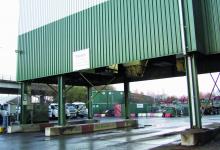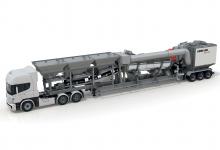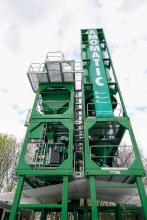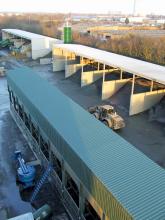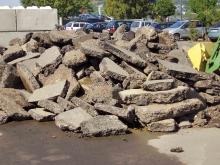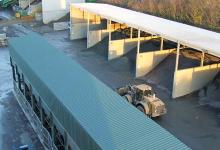An innovative asphalt plant is allowing the use of recycled materials and achieving major cost benefits - Mike Woof reports. UK construction firm FM Conway is seeing the benefit of the €11.5 million (£10 million) it has invested in its asphalt production facilities at Erith in Kent, close to UK capital London, since buying the site in 2005. The biggest single investment in the facility has been a new Benninghoven asphalt plant, which was commissioned in June 2010 and is now the core of the Erith operation.
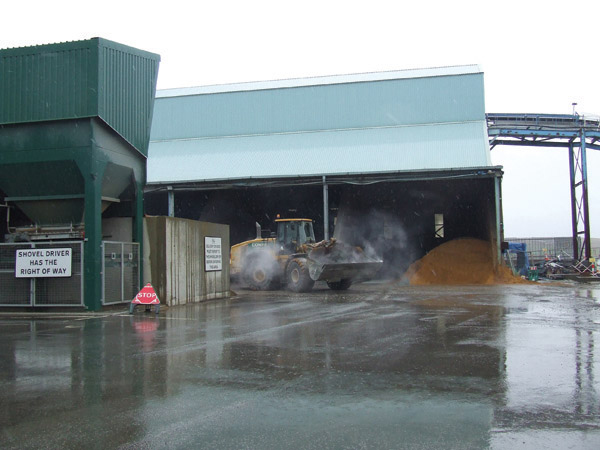
In the working area the operator of FM Conway's Caterpillar wheeled loader is in charge of vehicles as well as loading and stocking materials into the storage bays
An innovative asphalt plant is allowing the use of recycled materials and achieving major cost benefits - Mike Woof reports
UK construction firm FMThe plant features an innovative layout with a sophisticated parallel drum design that allows it to mix recycled asphalt pavement (RAP) along with fresh material to deliver a range of output grades. This is one of just a few asphalt plants in the UK capable of using RAP, a development that has allowed the company to pursue its policy of boosting recycling and lowering its carbon footprint. FM Conway is amongst the pioneers in the UK construction sector with regard to the use of RAP as a feed material in quality asphalt, although the technology has been available for some years.
According to the site's general manager, Tim Metcalf, the asphalt plant has the largest output capacity of any in the UK that is capable of using RAP as a feed material. It is also one of the most sophisticated and up-to-date asphalt plants in the country and the parallel drum configuration of this BA5000 system is a key design feature. He said, "It's two plants in one basically." He said that when FM Conway decided to buy a new asphalt plant the firm looked at various suppliers but opted for the Benninghoven system because the up-to-date equipment and comprehensive support package best met the company's anticipated needs.
As well as the sophistication of the plant, low running costs were also important purchase points and Metcalf said, "It has many energy saving features." He explained that the plant is completely enclosed and has substantial heat insulation allowing major savings in fuel. This is a major issue given fast climbing fuel costs and the enclosed and insulated design vastly lowers fuel consumption through the efficient, gas-fired burners when producing asphalt.
Another benefit of the enclosed and heatinsulated layout with gas heating comes in the form of reduced emissions.
The layout of the plant further helps reduce fuel consumption, with materials of varying grades are stored in eight covered bays. Each of the bays has a capacity of 3,000tonnes, providing a measure of weather protection and cutting the quantities of gas required to dehumidify the materials. Graded by size on delivery, the materials are screened prior to use to make sure they meet the grade required.
The mixing of the aggregates and the bitumen is all controlled remotely by computer from the central control room. But in the working area of the facility, the wheeled loader operator is in charge of loading and material delivery.
The RAP itself is provided by FM Conway's own contracting arm and Metcalf said, "We've got five mills and we plane off the roadway ourselves." Quality of this feed is monitored and he continued, "We screen it and make sure it has the right properties. We test it to make sure we've got a homogenous material." The dryer system for the fresh materials can handle up to 320tonnes/hour while the RAP is elevated through the plant at up to 240tonnes/hour. The mixer box has two feeds, allowing the use of fresh materials and RAP in percentages set by the output specification, with quantities carefully monitored by computer control. The fresh hot stone is held in a 300tonne storage hopper above the mixer, while the RAP may be used hot or cold depending on the product required and feed rate. To ensure that the bitumen in the RAP is not damaged, indirect heating is used through a uni-flow drum, a key feature of any plant using this recycled feed.
The quantities of RAP used in the mix vary, depending on factors such as available feed, throughput and the output specifications.
Metcalf said, "In some materials we can go as high as 80%." A significant proportion of the feed FM Conway processes through the facility is RAP though and he said, "We've invested millions in the plant so it can use reclaimed material.
RAP is carbon neutral because it is milled off the road." While employing RAP as feed achieves important sustainability targets, Metcalf pointed out that the key driver for FM Conway using this in asphalt production is that it provides a highly cost-effective source of good quality material that helps boost the firm's profitability.
He explained that the materials using the highest percentage of RAP are proprietary products used for car parks and driveways for example. "We have supplied lots of environmental materials for the Olympic Park." The quality of the asphalt made using a large percentage of RAP is high and Metcalf said, We've done rigorous tests on the material and it performs well even under hard traffic loads. In some surface courses you can use up to 10% of RAP and in some binder and base courses you can use up to 50%." The UK's Highways Authority sets the specification for the asphalt and FM Conway evaluates the feed that will meet the various requirements. Metcalf said, "We make a judgement on how much RAP we can put in on a rolling basis." But in the UK engineers can still be reluctant to specify asphalt containing RAP for use in major highway projects, despite the success of this type of product in countries such as the Netherlands. Metcalf said, "Engineers specify what they've always specified." Metcalf believes that asphalt using recycled material offers a major potential for contractors, particularly in countries where sustainability targets have to be met.
The quality of the product can meet tough specification requirements while the cost benefits make the use of milled asphalt extremely attractive to contractors, especially when compared with the expense of dumping this material in landfill. However Metcalf believes it may still take some time before the highway sector overcomes its reluctance to use this material more widely, or to try other new road surfacing materials. FM Conway is looking ahead and has investigated the potential for low energy, warm asphalt technologies such as those based on foamed emulsion for example but Metcalf said, "We still believe engineers like hot material." He added that in the UK at least, road engineers are also still wary of specifying warm asphalt and have yet to be convinced of the benefits of the material.
Developments are continuing at FM Conway's plant and will yield additional cost benefits too. Other upgrades to the facility will further boost the site's efficiency and provide additional environmental improvements. When FM Conway bought the site from Cemex in 2005, it featured a wooden ship to shore jetty that was very dilapidated. The firm opted to build a new ship loading facility, taking the long view that material deliveries by river would boost efficiency and make further cuts in carbon emissions. "In the latter part of last year we engaged BAM Nuttal to build us a jetty to allow ships with up to 5,000tonnes capacity." As part of this the company has also bought a new purpose-built crane from Sennebogen in Germany and the machine has a 500tonne/hour ship unloading capacity, allowing it to provide a steady flow of materials into the storage area and also reduce the time that vessels required to be docked alongside.
By using the new jetty, FM Conway will cut its reliance on truck transport, a major benefit to the firm as well as other road users given the congested roads in and around London. The move also helps to cut wear and tear on the local network caused by heavily loaded vehicles and Metcalf said, "It'll reduce truck movements in and out of the site by 12,000/year."
The plant is capable of producing up to 400,000tonnes/year of asphalt and in the first year since it was commissioned, had an output of around 300,000tonnes. Gains in annual production are anticipated although output is dependent on construction demand and local weather conditions, with the facility operating around the clock, seven days/week.
The asphalt produced at the site is used by customers within a radius of around 80km of the facility and as this takes in UK capital London and the 2012 Olympic site, demand is strong at present. The 15 staff at the site have to cope with all the usual fluctuations in local demand arising from the highly weather dependent road surfacing business.
The plant has a storage capacity of around 600tonnes so the firm has can hold a buffer supply of fresh asphalt to cope with spikes in demand during the peak summer road construction period and Metcalf said, "It produces up to 1,800tonnes/day." The majority of this asphalt, 70-80%, is used by FM Conway's own contracting arm although the company does supply other road contracting companies as well. Once produced the asphalt is loaded onto trucks for haulage to site. FM Conway has its own fleet of new
With the investment in the Benninghoven plant, the ship unloading facility and the profitable business opportunity arising from its use of RAP, FM Conway is amongst those European construction firms taking a lead in cutting its carbon profile. This is of note as the UK has been sluggish to invest in road recycling technologies unlike some other European countries. In the UK, there are only a few asphalt plants capable of handling RAP while in the Netherlands up to 30% of feed materials for asphalt production are from recycling processes. Metcalf added that this is because the Netherlands has to import construction materials, so it makes sense to use RAP. The country has developed road construction practices that use this feed to provide high quality surfaces capable of carrying heavy traffic volumes for long periods.
However there is less pressure for the use of RAP in countries where the quarrying industry is strong and the UK is by no means alone in being slow to adopt the use of RAP and other recycled materials in road construction.
But with the quality and cost effectiveness of RAP as a feed material now being shown by a few pioneering firms, it is only a matter of time before this kind of approach becomes more widespread worldwide. FM Conway is showing that the use of RAP is not only a more sustainable approach to road construction, but can make a substantial boost to the bottom line. With profitability being a target for any business, recycling materials clearly makes sound financial sense and this approach looks likely to tempt other construction firms to adopt similar methods.

